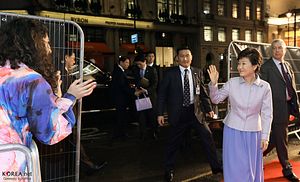Slightly over a year into its mandate, the Park Geun-hye administration is besieged from within and abroad. The Sewol ferry disaster and a series of other accidents have weakened the public’s confidence in the current government. At the same time, Seoul appears increasingly out of step with key regional partners on issues such as missile defense and sanctions against North Korea.
To make matters worse, the resignations of Prime Minister Jung Hong-won, Chief of the National Security Office Kim Jang-soo, and Director of the National Intelligence Service Nam Jae-joon in the fallout following the Sewol ferry disaster coincided with renewed provocations from North Korea along the Northern Limit Line.
All this adds pressure on the Park government to make decisive new appointments to not only consolidate the administration’s ability to coordinate coherent security policies, but also to forward a clear signal to Seoul’s partners and adversaries of the country’s foreign policy outlook and objectives.
The South Korean media is currently focused on Kim Kwan-jin, who had served as the Minister of National Defense since 2010 and has been selected to take over as the chief of the National Security Office.
Rising to the position of minister of National Defense after his predecessor, Kim Tae-yeong, was criticized for being too passive in his response to North Korea’s shelling of Yeonpyeong Island in December 2010, Kim Kwan-jin established his reputation as a hawk when he argued that South Korea should respond to future provocations from Pyongyang by targeting both the military installations that launch attacks on South Korea and their supporting units.
When President Lee Myung-bak’s term ended last year, Kim Kwan-jin was not initially selected to be in Park Geun-hye’s cabinet. However, when the National Assembly rejected Park’s first choice candidate for the post, Kim stayed on in the new government. There were suggestions earlier this year that Kim would be ousted from cabinet over his ministry’s failure to notice the penetration of South Korean airspace by North Korean drones. However, the sudden resignation of security-oriented advisers in May suddenly transformed Kim into a less dispensable member of the Park government. Now he is moving into the executive office structure within the Blue House.
There are two key concerns regarding his appointment.
First, there is worry that the Blue House is overly dependent on people with a military background in coordinating the country’s diplomacy and security.
Kim Kwan-jin has had a distinguished military career, having taken command of the Third ROK Army in 2005 and having served as the chairman of the joint chiefs of staff between 2006 and 2008. General Han Min-gu, who has been tapped to take over Kim Kwan-jin’s national defense portfolio, has also served as the chairman of the joint chiefs of staff from 2010 to 2011.
While South Korea has a need for people with military experience to produce robust defense policies, the positions in both the Ministry of National Defense and the National Security Office require a comprehensive understanding of the country’s overall needs, including its economic and diplomatic dynamics. In particular, the National Security Office has been described as the country’s “control tower” on foreign policy issues, overseeing South Korea’s growing role in the international community, and many have suggested that a civilian would be better suited in such a position.
Second, the absence of established moderates in the cabinet sends mixed signals to North Korea and further nullifies Park Geun-hye’s efforts to advance her “trustpolitik” with Pyongyang.
Even prior to her taking office, Park had spoken widely about her desire to engage in “trustpolitik” with the North. During her visit to Germany in March of this year, Park further elaborated on her policy by emphasizing humanitarianism, co-prosperity, and integration between the two peoples as the first steps towards unification. Yet, when Seoul had the opportunity to engage in discussions with Pyongyang last year on family reunions, the Kaesong Industrial Complex, and reopening of the Kumgang Mountains resort, the Park administration squandered the opportunity to advance the negotiations by needlessly amending the agenda.
Now, with a well-known hawk advising the president, it is possible that the cabinet reshuffle will signal to Pyongyang that Seoul is uninterested in negotiations. While Kim Jang-soo also had a military background and established his reputation on a firm stance towards Pyongyang, he maintained credentials as a moderate after serving as the Minister of National Defense under the progressive Roh Moo-hyun administration. Meanwhile, Kim Kwan-jin served in the Lee Myung-bak administration and had consistently taken an unequivocally hawkish stance on Pyongyang.
Nonetheless, there are signs that Park’s new cabinet might be able to deliver substantive changes to the situation in the Korean Peninsula and the region at large. At this year’s Asia Security Summit (Shangri-La Dialogue), Kim Kwan-jin voiced his support for providing North Korea with massive economic assistance if Pyongyang aborts its nuclear weapons program, revealing a more conciliatory position.
At the same time, Seoul is working to restart negotiations on the military information sharing agreement between South Korea, Japan and the United States, a process that fell apart in 2012 after massive public opposition in South Korea undermined the signing of the pact between Seoul and Tokyo.
Could this increased rhetorical nuance and revamped negotiations be signs of things to come? Perhaps, but the new cabinet will have much to do to silence the skeptics.































